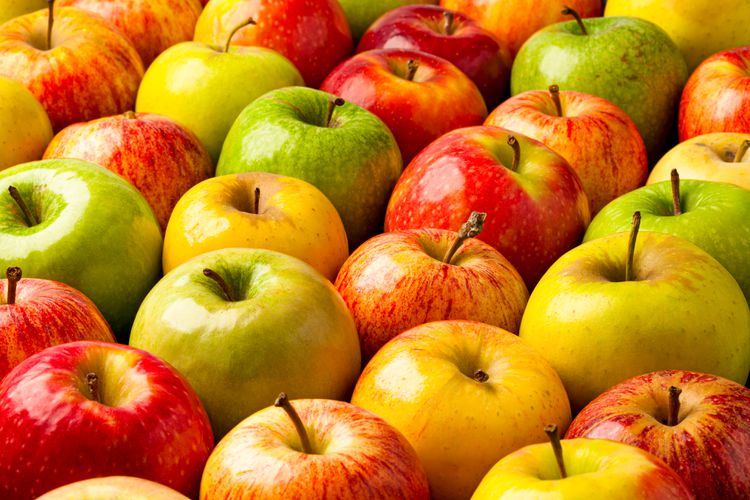Health Benefits of Apples
What are the health benefits of apples?
Apples are a popular fruit that offer several health benefits. Here are some of the key health benefits of apples:
- Nutrient-Rich: Apples are low in calories but high in nutrients, including fiber, vitamin C, potassium, and various antioxidants. A medium-sized apple provides about 4 grams of fiber and 14% of the daily recommended intake of vitamin C.
- Heart Health: Apples are rich in soluble fiber, which can help lower cholesterol levels and improve heart health. The antioxidants in apples, particularly flavonoids and polyphenols, may also help reduce the risk of heart disease by reducing inflammation and oxidative stress.
- Digestive Health: The fiber content in apples can help promote healthy digestion and prevent constipation. Apples also contain pectin, a type of soluble fiber that can help feed beneficial gut bacteria and improve gut health.
- Weight Management: Apples are a filling and low-calorie food, making them a great snack option for weight management. The fiber and water content in apples can help increase feelings of fullness and reduce calorie intake.
- Blood Sugar Control: The fiber and polyphenols in apples can help regulate blood sugar levels and reduce the risk of type 2 diabetes. They may also improve insulin sensitivity and reduce the absorption of glucose into the bloodstream.
- Improved Lung Function: Some studies suggest that eating apples may help improve lung function and reduce the risk of respiratory diseases such as asthma.
- Cancer Prevention: The antioxidants in apples, particularly quercetin, catechin, and chlorogenic acid, have been studied for their potential role in cancer prevention. Some studies have found that apple consumption may be linked to a reduced risk of certain types of cancer, including lung cancer, colorectal cancer, and breast cancer.
- Hydration: Apples have a high water content, which can fight dehydration and support overall health.
- Dental Health: Chewing apples stimulates saliva production, which can help reduce the risk of tooth decay and gum disease. However, it’s important to rinse your mouth with water after eating apples to minimize the risk of enamel erosion.
- Brain Health: Some studies suggest that the antioxidants in apples may help protect brain cells from oxidative stress and reduce the risk of neurodegenerative diseases such as Alzheimer’s disease.
Overall, apples are a nutritious and versatile fruit that can be easily incorporated into a healthy diet to provide a range of health benefits. Eating a variety of fruits and vegetables, including apples, can help support overall health and well-being.
What are the health risks of apples?
Apples are generally safe and offer numerous health benefits when consumed as part of a balanced diet. However, there are a few potential risks associated with apples, particularly in certain individuals or under certain circumstances:
- Pesticide Residues: Conventionally grown apples may contain pesticide residues, which can pose health risks if consumed in large amounts. To minimize exposure to pesticides, it’s recommended to wash apples thoroughly or choose organic apples when possible.
- Allergic Reactions: Some individuals may be allergic to apples or develop oral allergy syndrome (OAS) when consuming apples. Symptoms of OAS include itching or tingling in the mouth, throat, or ears, and can range from mild to severe. People with apple allergies should avoid consuming apples and products containing apples.
- Gastrointestinal Issues: Eating large amounts of apples or consuming apple products high in fiber, such as apple juice or applesauce, may cause digestive issues such as bloating, gas, or diarrhea in some individuals, especially those with sensitive digestive systems.
- Dental Health: While apples can help stimulate saliva production and reduce the risk of tooth decay, they also contain natural sugars, which can contribute to tooth decay if consumed in excess. It’s important to practice good dental hygiene, such as brushing and flossing regularly, to maintain oral health.
- Cyanide in Apple Seeds: Apple seeds contain amygdalin, a compound that can release cyanide when metabolized in the body. However, the amount of cyanide in apple seeds is very small and unlikely to cause harm when consumed in small quantities. Swallowing whole seeds without chewing is safe, but it’s best to avoid crushing or chewing apple seeds.
Overall, the health benefits of apples outweigh the potential risks for most people. However, individuals with apple allergies or sensitivities should avoid consuming apples, and those with digestive issues should consume them in moderation to avoid discomfort. It’s also advisable to wash apples thoroughly and consider choosing organic apples to minimize exposure to pesticide residues.




